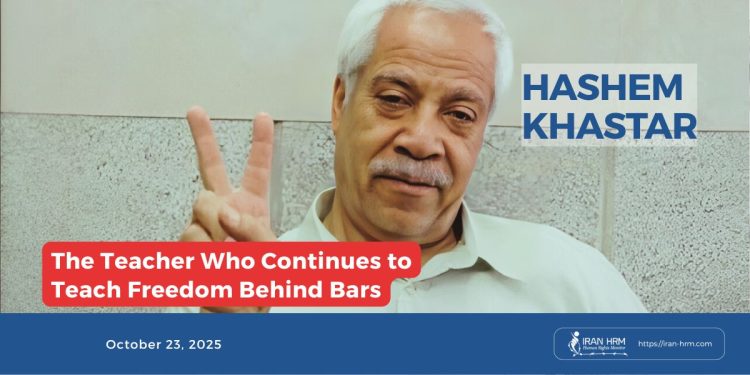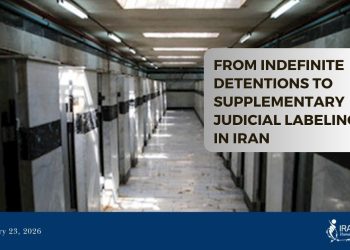Hashem Khastar, a 72-year-old retired educator and a leading voice in Iran’s teachers’ movement, has been held for more than eight years in Vakilabad Prison in Mashhad under harsh and isolating conditions. Known as the “representative of Iran’s teachers,” he has been sentenced to over 18 years in prison and exile for peacefully defending teachers’ rights and writing open letters calling for justice and freedom.
Life and Background
Hashem Khastar was born on 23 May 1953 in Birjand, northeastern Iran. He graduated in Agricultural Engineering from Urmia University and spent decades teaching at agricultural schools in Mashhad and Torbat Jam. As one of the founders of the Teachers’ Association of Khorasan, he became a leading advocate for the rights of Iranian educators.
Khastar has long believed that education is the cornerstone of freedom. As he once said: “Education is the path to awareness and liberty; if teachers fall silent, generations will die voiceless.”
Abduction and Forced Hospitalization
In November 2018, agents of the Ministry of Intelligence abducted Khastar from outside his home and transferred him—without a court order—to a psychiatric hospital in Mashhad. In protest against this inhuman act, he went on hunger strike. After 19 days, and following public outcry, he was released. Later, in a message from prison, he wrote: “When the agents of Mashhad’s intelligence abducted me and took me to a psychiatric hospital, if it were not for the voice of the people, I would no longer exist on this earth.”
Arrest and Harsh Sentences
On 11 August 2019, while attending a peaceful protest in front of Mashhad’s Revolutionary Court in support of fellow detained teachers, Khastar was arrested again. The court sentenced him to 16 years in prison, three years of travel ban, and two years of exile in Nikshahr, Sistan and Baluchestan Province. In July 2023, he received another two-and-a-half-year sentence for allegedly “sending his memoirs abroad” from prison. In all cases, he was denied access to a lawyer and a fair trial. Court records falsely claimed he remained in custody due to “failure to post bail,” even though his family had repeatedly offered to provide it.
Life Inside Vakilabad Prison
Hashem Khastar is held in Ward 1/6 of Vakilabad Prison, a high-security section designated for political and ideological prisoners. He lives in a small, monitored cell under constant surveillance cameras. He is allowed only one hour of outdoor time per day, divided into two thirty-minute intervals—during which he must also make his monitored phone call to his family. His requests for in-person visits, access to books, and medical care have been consistently denied. Many of his writings and personal notes have been confiscated or destroyed by prison officials. Former cellmates describe him as “a man who continues teaching in silence, even in solitary confinement.”
Health Deterioration and Medical Neglect
At 72, Khastar suffers from heart disease, respiratory problems, and gastrointestinal disorders. According to his wife, he is forced to rinse prison food with water before eating due to excessive salt content. Despite repeated pleas from his family, he has not been granted any medical leave or access to specialist treatment. One source close to the family said: “Hashem has been in complete isolation for years—no treatment, no books, no free communication. Only his conscience keeps him alive.”
A Voice of Conscience from Prison
During his long imprisonment, Khastar has written numerous letters and messages that continue to circulate among Iranian teachers. In one, he wrote: “Prison for a teacher who once taught freedom is a new classroom for teaching resistance.” And in another: “I am in prison, but freer than those who remain silent.” These words have become slogans of hope in teachers’ protests across the country, symbolizing moral resistance against the regime’s repression.
Symbol of Iran’s Imprisoned Teachers
Hashem Khastar is more than a political prisoner—he is the moral conscience of Iran’s educators. His unwavering commitment to truth and justice, even under physical and psychological torture, has made him a symbol of integrity and courage. As he wrote from his cell: “I believe in the future of Iran. A generation will rise that will no longer accept silence.”
Call for Immediate International Action
The continued detention of Hashem Khastar represents a clear violation of Articles 19, 22, and 26 of the Universal Declaration of Human Rights and the International Covenant on Civil and Political Rights, both ratified by Iran. International bodies—including the UN Human Rights Council, the Special Rapporteur on the situation of human rights in Iran, and the International Labour Organization (ILO)—must urgently intervene to secure his immediate and unconditional release, and to end the systematic persecution of teachers and labor activists in Iran.







